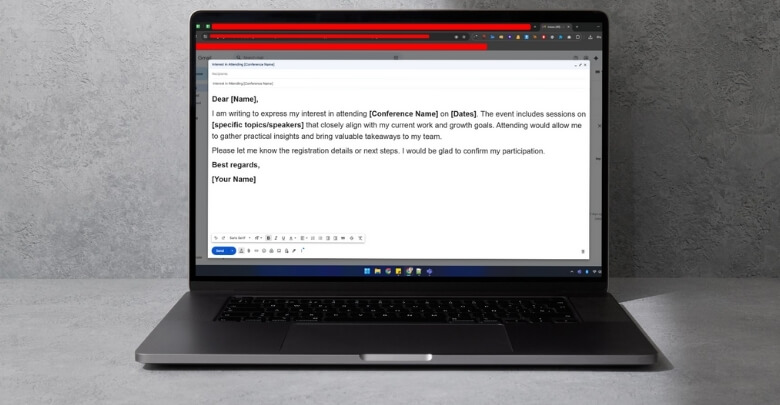Conferences are more than just events; they’re opportunities to learn, connect, and grow within your field. Many professionals and students see them as valuable stepping stones for both personal and career development. But how do you express interest in attending a conference?
You express interest by showing clear reasons for wanting to join. Point out the sessions or speakers that matter to you, explain how the event connects to your goals, and highlight the value it brings to your work or studies.
Doing this the right way sets you apart and makes your application or request more likely to be approved. Keep reading for step-by-step guidance, real examples, and templates that will help you express interest effectively and confidently.
How Do You Express Interest in Attending a Conference?
Showing your interest in a conference is all about making your enthusiasm visible in the right way. Instead of just saying you’d like to join, you need to communicate why the event is important to you, what you hope to gain, and how it connects to your role or studies. There are a few effective ways to do this:

Direct Conversation
If the conference is suggested by your workplace, start with a face-to-face or video chat with your manager. A simple talk where you share why certain sessions matter and how you’ll bring back useful insights can work better than a long request.
Mini Script: “I’ve seen that [Conference Name] is coming up. It has sessions on [topic] that could directly help with [specific task/project]. I’d like your thoughts on attending.”
Professional Networking Platforms
Many conferences have active pages on LinkedIn or similar platforms. Commenting on posts, sharing updates, or messaging organizers directly is a clear way to show genuine interest. This also helps you connect with other potential attendees.
Mini Script (LinkedIn DM): “Hi [Name], I came across [Conference Name] and noticed your involvement. I’m very interested in the sessions on [topic]. Could you share how I can join or stay updated?”
Formal Application or Registration
Most conferences require some form of registration. Here, you can highlight your background and your reason for wanting to attend. For international events, such as conferences in Canada, the USA, or the UK, being specific about your goals and professional value is especially important because organizers often receive applications from diverse participants.
Social Media Engagement
Following the event on platforms like Twitter or LinkedIn and actively engaging with updates is another modern way to express your interest. Sharing posts or using the official hashtag shows enthusiasm and keeps you on the organizers’ radar.
Email or Written Request
A well-written email remains one of the most professional and direct ways to express interest in attending an event. It lets you clearly explain your intent, your focus areas, and what you’ll contribute or gain from the event.
Sample Email Template
Subject: Interest in Attending [Conference Name]
Dear [Name],
I am writing to express my interest in attending [Conference Name] on [Dates]. The event includes sessions on [specific topics/speakers] that closely align with my current work and growth goals. Attending would allow me to gather practical insights and bring valuable takeaways to my team.
Please let me know the registration details or next steps. I would be glad to confirm my participation.
Best regards,
[Your Name]
No matter the method you choose, whether it’s a quick talk, a social post, or a formal email, the goal is to make your enthusiasm clear and connect it to your goals. When you do this well, you increase your chances of not only attending the conference but also making the most out of it.
Simple Steps to Show Your Interest in a Conference
Before you send an email, talk to your manager, or reach out to organizers, it helps to prepare. A little planning ensures your request sounds confident and convincing. Think of these quick steps as a checklist to get ready, follow them, then move on to the method that works best for you.
Step 1: Identify the Relevance
Check the conference agenda and point out the sessions or speakers that connect with your role, studies, or goals. This proves your interest is specific and purposeful.
Step 2: Define 2–3 Clear Goals
Decide what you want to achieve. It might be learning new methods, connecting with experts, or gaining insights for a current project. Simple goals make your request stronger.
Step 3: Estimate the Value
Think about how attending will benefit you and others. Will you share notes with your team, apply strategies in your work, or bring new ideas to ongoing projects? That value matters.
Step 4: Craft a Clear Message
Write your request in plain words. Explain why the conference fits your goals and what you hope to gain. Keeping it short and focused makes it easier for others to approve.
Step 5: Send and Follow Up
Once your request is sent, allow a few days. If there’s no reply, follow up politely. It shows you’re genuinely interested in attending and committed to making the most of the opportunity.
This quick checklist helps you prepare before making the actual request. By sorting out your goals, value, and message in advance, you’ll find that expressing interest, whether through email, a meeting, or social media, becomes far easier and more effective.
What to Include in Your Request?
Showing interest in attending a conference works best when you frame your request the right way. It’s not just about saying you want to go; it’s about giving clear details so others see the value. Here are the main points to cover that will strengthen your request.
Specific Sessions or Speakers
Point out the sessions, panels, or speakers you’re most interested in attending. By naming them, you show you’ve researched the program and have a real purpose for going. This helps decision-makers see that your request is thoughtful and directly tied to your role.
2–3 Outcomes You Expect
Make your goals clear by highlighting two or three outcomes you hope to achieve. These could include learning practical skills, exploring solutions to a project challenge, or meeting professionals in your field. Specific outcomes show your decision to participate in a conference isn’t just personal interest but a step toward growth.
Estimated Costs
Always include a rough breakdown of expected expenses such as registration fees, travel, and lodging. Being upfront about costs makes your request transparent and practical. It also helps others quickly weigh the benefits of your attendance against the budget available, improving the chance of approval.
Deliverables After the Conference
Offer to bring back value by committing to share what you learn. This could be preparing a presentation, circulating notes, or giving your team a recap of useful insights. Deliverables show that the benefits won’t stop with you; they’ll reach your entire organization.
When your request covers these points, it looks clear, professional, and easier to approve. By showing relevance, goals, costs, and follow-up actions, you prove your interest in the conference is genuine and that it can create value for more than just yourself.
Common Mistakes to Avoid
When asking to attend a conference, the way you present your request matters as much as your enthusiasm. A few common mistakes can weaken your chances, even if your intentions are good. Knowing them ahead of time will help you avoid trouble and stand out positively. Let’s look at the pitfalls and how to fix them.
Unclear Purpose
One of the biggest mistakes is not clearly explaining why you want to attend. Instead of giving a vague reply like “it will be useful,” talk about your purpose of attending conferences by pointing to the exact sessions, speakers, or skills that connect with your role or studies.
No Clear ROI
If you don’t explain the benefit, decision-makers may not see the value. Saying you’ll “learn new things” isn’t enough. Instead, highlight specific outcomes like applying new strategies, improving a project, or sharing knowledge with colleagues. Clear ROI makes approval much easier.
Missing Cost Breakdown
Forgetting to include costs can make your request look incomplete. People want to know the full picture, including registration, travel, and lodging. By giving a simple breakdown upfront, you save time, avoid confusion, and show that you’ve thought things through carefully.
Sending Late Requests
Waiting until the last moment to ask is another common issue. Late requests can cause budget or scheduling conflicts, making it harder to get approval. Always ask well in advance, giving enough time for managers or organizers to review and respond comfortably.
No Follow-up
Sending one request and never checking back often leaves things hanging. If you don’t get a response, a polite follow-up shows you’re serious and organized. Keep it short, friendly, and respectful. This simple step often makes the difference between silence and approval.
Avoiding these mistakes shows that you are serious, organized, and respectful of others’ time. By being clear, timely, and thoughtful, you make it much easier for your request to be accepted and your conference interest to be taken seriously.
Following Up After Sending Your Request
Once you’ve sent your request to attend a conference, the waiting can feel uncertain. Following up politely is a smart way to show you are serious without being pushy. Timing and tone matter the most here, so it’s important to get them right. Read on to learn when and how to follow up effectively.
When to Follow Up
The best time to follow up is usually five to seven business days after sending your request. This gives the recipient enough time to review your message and respond. Following up too early might feel impatient, while waiting too long can make your request easy to forget.
How to Follow Up Politely (Step by Step)
- Wait a few business days before sending your follow-up, usually 5–7 days.
- Start with a polite reminder that you previously sent a request.
- Briefly restate your interest, for example, by saying you previously expressed interest in the event.
- Offer to provide extra details such as costs, agenda, or expected outcomes.
- Close with gratitude and ask for confirmation in a respectful way.
Sample Follow-up Email Template
Subject: Follow-Up on Conference Attendance Request
Dear [Name],
I wanted to kindly follow up on my earlier request to attend [Conference Name] on [Dates]. The sessions on [specific topics] are very relevant to my current work, and I am eager to apply what I learn to [team/project].
If you need any further details, I’ll be glad to provide them. I would appreciate your confirmation so I can make timely arrangements.
Thank you for your time and consideration.
Best regards,
[Your Name]
A step-by-step follow-up keeps you polite, professional, and easy to respond to. By showing patience, clarity, and respect, you increase the chances of getting the approval or confirmation you need without causing any discomfort.
Reasons to Mention in Your Request
When you’re asking to attend a conference, it helps to back up your request with clear reasons. Explaining your motivation for attending a conference shows how the event connects to your growth and what value it can bring back. Here are a few strong points you can use in your request.
Learn the Latest Trends
Conferences are where new ideas and updates are first shared. By attending, you stay current with industry changes and gain insights that aren’t always easy to find elsewhere. Mentioning this shows you’ll bring back fresh knowledge for your role.
Build Strong Networks
Meeting people face-to-face makes networking much easier. You can connect with peers, experts, or potential partners in a way that emails and online chats don’t allow. Highlighting this in your request shows how attending could open doors for future collaborations.
Spark New Ideas
Listening to different perspectives often triggers solutions you may not think of on your own. A single panel discussion can give you new strategies to use in your projects. Adding this reason proves the event can fuel creativity and problem-solving.
Share Insights With Peers
Letting your manager or team know you’ll share what you learn makes your request stronger. Whether it’s a quick recap, slides, or a short team talk, it shows the benefits won’t stop with you but will help others as well.
Using reasons like these in your request makes it clear that attending the conference is not just about personal interest; it’s about adding value. By showing how your attendance benefits both you and your team, you make your case far more convincing.
Frequently Asked Questions
People often have small but important questions once they finish reading about expressing interest in attending a conference. These details can help them feel more confident before making their move. Here are some of the most common queries answered in simple words.
Can I Show Interest Without Committing Right Away?
Yes, you can. You might simply express curiosity about the sessions or speakers and ask for more details. This shows your interest while keeping your options open until you’re ready to commit.
Should I Mention If I’ve Attended Similar Conferences Before?
Definitely. Sharing past experiences proves you take these events seriously and know how to gain value from them. It also shows that attending again could bring even more useful outcomes for you and your organization.
Is It Okay to Ask About Discounts or Special Rates?
Yes, and it’s more common than you may think. Many conferences have student rates, early-bird offers, or group discounts. Politely asking about these options is a smart way to make attendance more affordable.
Can I Express Interest Through Social Media Alone?
You can, but it’s better to use social media as support rather than the only method. Engaging with posts and hashtags helps, but a direct message or email feels more personal and professional.
How Soon Should I Confirm After My Request Gets Approved?
It’s best to confirm as quickly as you can. Prompt replies show respect for the person who approved your request. It also secures your place at the conference before any deadlines pass.
Do Organizers Like When Attendees Offer to Volunteer?
Yes, many do. Offering to volunteer at sessions or activities shows commitment and genuine interest in the event. It can also give you extra opportunities to connect with speakers and other participants.
Is It Helpful to Mention How I’ll Share Learnings With My Team?
Absolutely. Explaining how you’ll share notes, run a short presentation, or recap the main points adds extra value to your request. It tells decision-makers that the benefits will go beyond just your personal growth.
Concluding Lines
Expressing interest in a conference is more than just sending a quick message; it’s about showing clarity, purpose, and professionalism. When done right, it highlights both your enthusiasm and the real value you can bring back.
So, how do you express interest in attending a conference? The best approach is to explain your reasons clearly, point out what you expect to gain, and show how your participation benefits others as well. This balanced request is far more convincing.
Ultimately, a thoughtful expression of interest opens the door to learning, networking, and growth opportunities that conferences provide. Keep these points in mind, apply them carefully, and you’ll increase your chances of not only attending a conference for the first time but also making the most of the experience.







